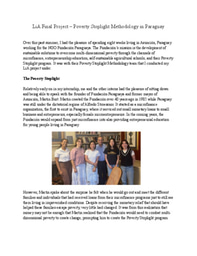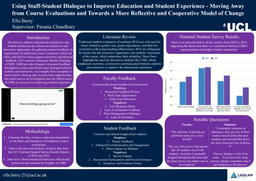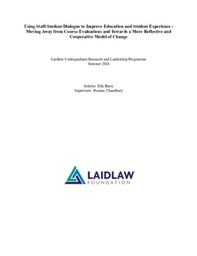When I look back on my time as a Laidlaw Scholar, I can see just how much my idea of leadership has shifted. In my first year, I worked on a research project about Continuous Module Dialogue (CMD) at UCL. The goal was to move away from one-off course evaluations that are often prone to biases and instead move towards a collaborative process that helps students and staff have an ongoing conversation. At the time, I thought of it mainly as an academic project, but it also taught me a lot about what it means to lead ethically. During that project, I was in charge of interviewing various staff and students and representing their beliefs accurately and faithfully no matter what they said. My main goal was to make no matter what different people’s voices are heard.
The various leadership training weekends at both Cumberland and UCL pushed that even further. During that time, I started to see leadership as being more about character than it is position. The different exercises like the Sheep game or block building helped me see how important collaboration and teamwork is to leadership. Surrounding yourself with like-minded, committed people helps build you up even further as a leader.
In my second year, I took those lessons far away from UCL to Paraguay and Fundación Paraguaya. The organisation’s Poverty Stoplight was designed to help families assess themselves and build their own plans for improvement. The way the Fundación approached leadership really struck a chord within me. Instead of telling people what their problems were or prescribing solutions, they created tools that handed agency back to them. Leadership isn’t always about providing all the answers, but instead supporting and inspiring others to forge their own path. This idea is how I want to go about ethical leadership, helping to create conditions for other people to succeed on their own.
This experience also changed how I understand what it means to be a global citizen. Before, I might have said it was about being informed about global issues or simply being open to travel. However, living and working in Paraguay has shown me that it’s something deeper. It’s about fully engaging with another culture including learning the language, respecting traditions, and being willing to contribute without overshadowing. From working with families in Cerrito to university dropouts, it felt amazing being able to meaningfully engage with and help a community outside my own. I realised that being a global citizen is about reciprocity. While I got to learn and grow from Paraguay and the people, I also brought energy, respect, and curiosity in return.
Looking ahead, I want to keep building on these lessons. The biggest strategy for me is going to be active and honest listening. Both CMD and my time in Paraguay taught me the importance of making space for voices that often get overlooked. Being a leader is all about understanding what others may need, not just yourself. I also have learned and will follow the understanding that real change takes patience, and leadership is about working with entire communities rather than simple quick fixes. Lastly, I want to keep saying yes to discomfort and leaving my comfort zone. The moments I was most nervous about from running CMD interviews to arriving in Asunción without much Spanish, those were the ones that eventually helped me grow the most in the end. I applied to Laidlaw mostly thinking about research, but what I’ve taken away is far bigger than that. These two years have been about learning how to lead with honesty, humility, and respect, and about seeing myself as part of something much larger than my own work.



Please sign in
If you are a registered user on Laidlaw Scholars Network, please sign in